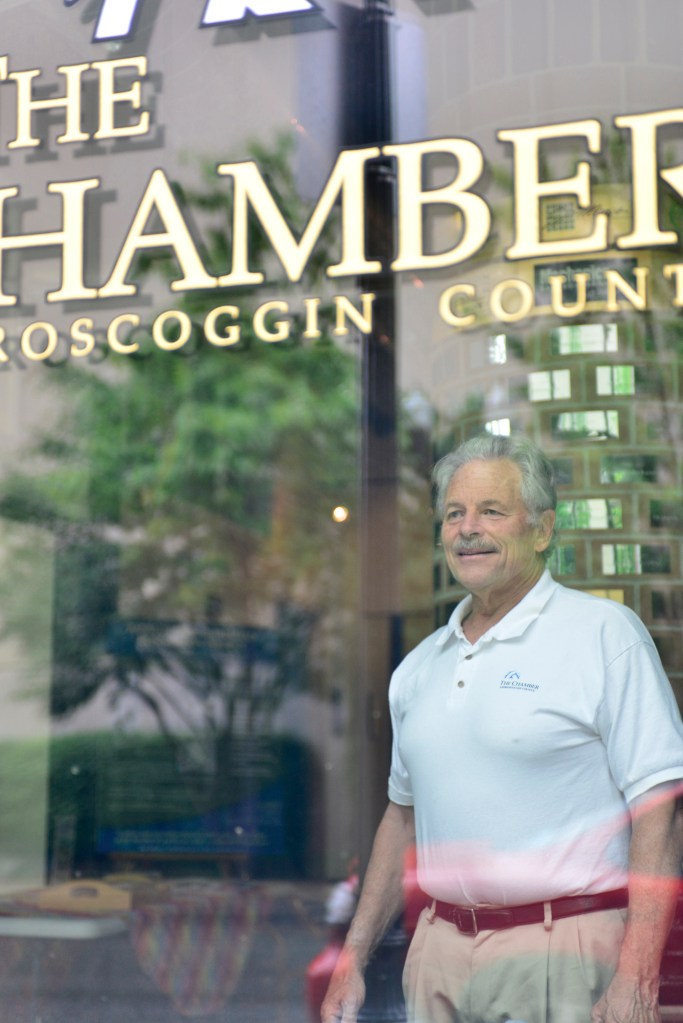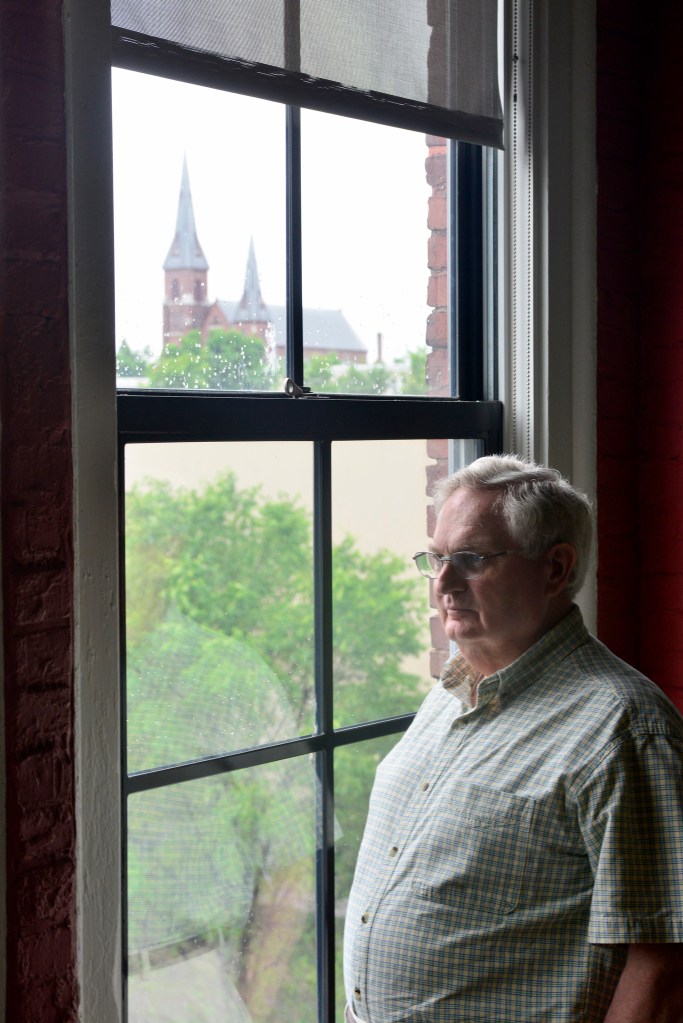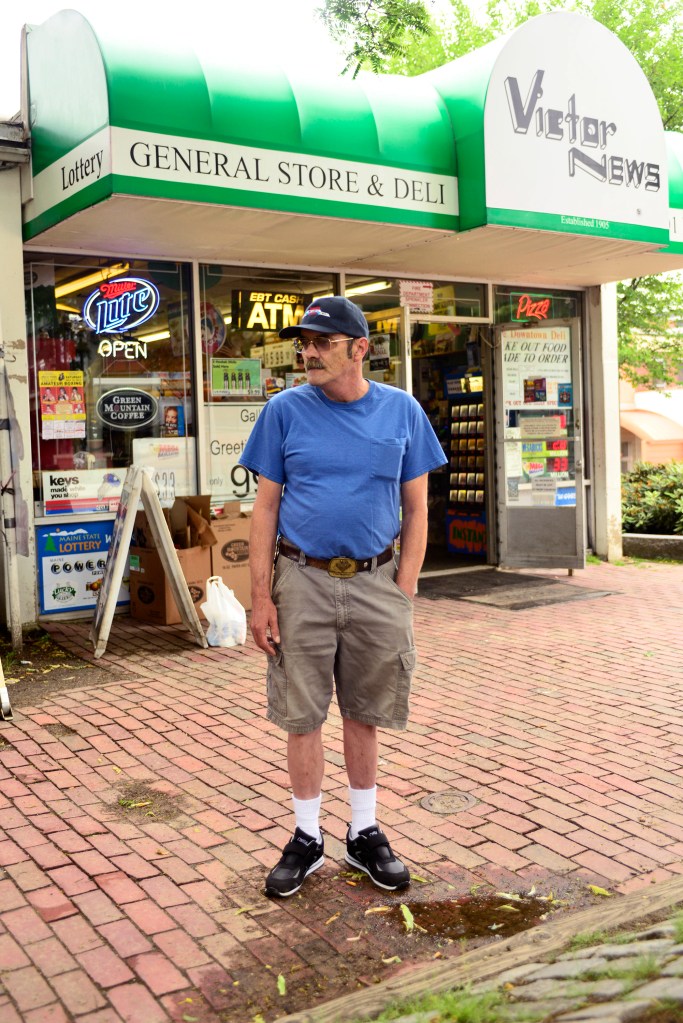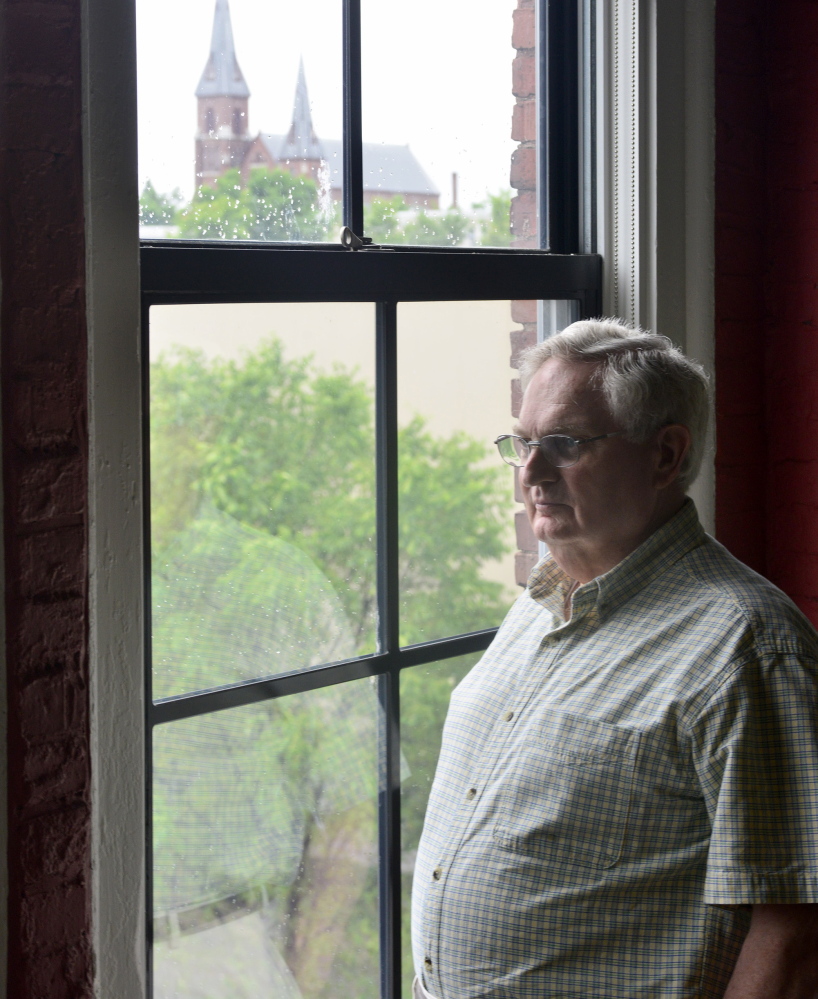LEWISTON AND AUBURN — The three-ring binder made a thud when Lucien Gosselin placed it on the table.
The report labeled “Citizens Commission on Lewiston-Auburn Cooperation” is 4 inches thick, exceeds 1,000 pages and gazes back several decades into the history of two former mill towns bisected by the Androscoggin River.
Gosselin, former longtime director of the Lewiston-Auburn Economic Growth Council and former Lewiston city administrator, could recite the contents by heart at this point.
“What this report shows is that we’ve been working together for 140 years anyway,” Gosselin said. “It’s time to stop tiptoeing around.”
Lewiston and Auburn have been nibbling around the edges of merging into one city that would rival Portland in population, but the two cities have always kept their autonomy, even though many people already refer to them in tandem, either as L/A or the Twin Cities.
The creation in June of a joint charter commission, made up of three elected representatives from Lewiston and Auburn each, could change that.
That commission’s task – which begins in earnest at its first meeting Monday – is simple: Draft a charter for a new city.
The harder part, though, will be putting forth a plan that details the logistics of merging the two and then selling that plan to voters, who ultimately will decide in an election whose date has yet to be determined.
If successful, it would be the first time in more than 90 years that two Maine municipalities have merged.
“I think it’s doable. The challenge will be educating people that it’s the right thing to do,” said Chip Morrison, head of the Androscoggin County Chamber of Commerce, former city manager of Auburn and a member of the charter commission. “But there is a lot of courage just in having this discussion. No one else is doing it.”
A strong group of supporters like Gosselin and Morrison, who are convinced that a merger would create efficiencies for the two cash-strapped cities, has given an old idea new life, but enormous challenges lie ahead.
Unwinding decades of municipal infrastructure is enormously complicated.
And more important, Lewiston and Auburn each have strong – and sometimes antithetical – histories. Removing emotion from the debate would be virtually impossible.
At the moment, sentiment is divided mostly into two camps: Those who say, “It’s about time,” and those who say, “Over my dead body.”
Auburn Mayor Jonathan Labonte, perhaps the most influential skeptic, calls the merger a “romantic notion” and doesn’t believe it will achieve the cost savings and operational efficiencies to justify all the work.
“There are plenty of models for being more efficient while maintaining local control,” Labonte said.
Others, though, are more optimistic.
“If there is fear, I think it’s the fear of losing something,” said Michael Beaulieu, a commission member and four-term House member from Auburn. “I think some fear is normal.”
HISTORY OF COLLABORATION
The last successful merger of two Maine municipalities was the marriage of Dover and Foxcroft, which, like Lewiston and Auburn, were dominated by manufacturing industries.
That was 1922.
Lewiston and Auburn actually tried to merge for the first time 50 years earlier than that. It even went to a vote.
Lewiston voters – or more accurately, Lewiston’s men, since women were not yet allowed to vote – approved the creation of a joint city. Auburn, however, rejected the measure by seven votes, according to Morrison.
That failure did not stop the two cities from working together.
Shortly after the merger vote in the 1870s, the two cities combined to build a railroad that would bring immigrant millworkers to the Twin Cities from Canada.
Lewiston’s economy was dominated by the many thriving textile mills that drew their power from the river. Auburn bustled with shoe factories.
The mills are gone now but the two cities still own the railroad jointly, with Lewiston holding a 75 percent share.
Before World War II, an airstrip in Auburn became a joint municipal airport for the two cities. That led to a shared industrial park on the same land and a revenue-sharing agreement between Lewiston and Auburn.
As the two communities worked on cleaning up their rivers and streams in the 1960s after decades of pollution from the mills, they built a joint wastewater treatment plant that is still in use today.
In 1980, the creation of the Lewiston-Auburn Economic Growth Council combined the economic development arms of the two communities, which were struggling to find their identities in the wake of the manufacturing bust.
There were major merger conversations again in the 1980s and 1990s. None gathered steam.
The most recent example was in the last decade, a discussion that resulted in the mammoth report on Citizens Commission on Lewiston-Auburn Cooperation that sits on a shelf in Gosselin’s office.
That report was a road map for how to merge, but the political will to take the next step still wasn’t there.
According to a poll commissioned in 2007 by the citizens commission, support for a merger was tepid. When asked what Lewiston and Auburn should do going forward, 40 percent said the cities should cooperate, but only 16 percent said the cities should work toward a complete merger.
Once again, the merger discussion dissipated.
Only it didn’t. It was always there.
Last spring, Lewiston council president Mark Cayer picked up the baton.
During a joint meeting of both city councils, Cayer proposed settling the debate for good. He was ready to ask each council to authorize the formation of a joint charter commission.
But before he could, members of the audience said they would take on the task. If supporters could gather 1,000 signatures in each community, voters would be able to create and elect members of the charter commission.
It took until June of this year, but for the first time in modern history, the idea of a Lewiston-Auburn merger had a buy-in from the public.
THE BENEFITS
Ed Barrett has been Lewiston’s city administrator for the last two years, but before that he spent 20 as city manager in Bangor, Maine’s third-largest city. He has seen the discussion about regionalization ebb and flow over the years.
Barrett said the infrequency with which communities discuss merging does not surprise him because municipal government is the state’s strongest form.
But he said the time might be right for Lewiston and Auburn.
“I think both cities are under considerable fiscal restraint and it’s only going to get worse,” he said.
The choices are equally bad: Raise taxes or cut services.
The goal of a merger is to make government more efficient while still providing the same level of services. One police department would be more cost-effective than two, for instance. The same goes for fire, public works and school departments.
But not everyone is convinced of the cost savings.
“It’s easy to say that (merging) would be more efficient, but these two cities already are pretty efficient,” said Clint Deschene, Auburn’s city administrator.
The financial reason is not the only benefit, supporters say.
Lewiston Mayor Robert Macdonald said he’s 100 percent behind the idea but he doesn’t necessarily think it will save money, at least in the short term.
“I think it makes us a serious player in Augusta and outside of Maine,” he said.
Combining Lewiston and Auburn would create a city of about 60,000, small by U.S. standards but big in Maine. Only Portland, with its 66,000 residents, is larger.
Barrett agrees with his mayor.
“If we had a stronger and more cohesive voice when it comes to state policy, I think that could help,” he said.
Barrett also said the Twin Cities suffer from a misperception statewide that they are nothing more than failed mill towns. A new city could provide an unprecedented opportunity to rebrand.
Holly Lasagna, one of two women elected to the joint charter commission, works at Bates College in Lewiston but lives in Auburn. She’s originally from Rhode Island, so she has no allegiance to either city.
She said she has always wanted to get involved civically and this is her first opportunity.
“It’s going to be a learning opportunity for me,” she said, joking that she’s not entirely sure what she has gotten herself into.
More than anything, Lasagna said she wants the process to be transparent and inclusive. The more buy-in from the community, the better chance of success, she said.
THE CHALLENGES
Joe Gray runs a small business in Auburn, where he’s lived for the last 12 years. He has no interest in seeing his city merge with Lewiston.
“All it means is Lewiston would take over Auburn,” he said. “They have more voters.”
Lewiston’s population is about 36,000, according to the 2010 census; Auburn’s about 24,000. Gray said that means the makeup of any joint governing body would tip in Lewiston’s favor.
He also doesn’t like the politics driving the discussion.
“The old-boy network in town is behind this,” Gray said. “A lot of people think this is Chip Morrison and Lucien Gosselin’s legacy project. And they’re running out of time.”
Gosselin stepped down from his Economic Growth Council post in late June, and Morrison has announced his retirement, ostensibly to focus their attention on the merger.
Gray’s frustration hints at a broader, more deep-seated rivalry between the two communities that goes back decades: Lewiston was blue collar and less educated. Auburn was white collar and more affluent. Millworkers lived in Lewiston but the owners lived in Auburn. Lewiston was reliably Democratic. Auburn was Republican.
The stark differences are all but gone today, but the rivalry still exists.
Labonte said the vote may pit “grassroots citizens versus the civic and political elite.”
Others, though, said that’s no reason to reject a merger.
“There is an unnecessary competitive nature between the two cities,” Gosselin said.
Even if citizens can get past the history, Labonte has more practical reasons for his skepticism.
“I can’t speak for Lewiston, but we have some exciting things coming to Auburn and I don’t want this discussion to turn the business world aside,” he said.
The Auburn mayor also doesn’t like the fact that Lewiston’s debt – $160 million – dwarfs Auburn’s total of about $61 million.
Lasagna said the commission’s challenge is going to be coming up with an answer for all of those “what if” questions.
For instance, many employees in each community are represented by a number of labor unions, each of which has an existing contract.
The joint charter commission has no dedicated funding. Morrison and others have been trying to apply for grants and/or private funding and thinks he’ll be successful.
“I don’t think there are any challenges that can’t be overcome, but it would take time,” Barrett said.
PERSUADING TWO COMMUNITIES
Commission member Gene Geiger, CEO of Geiger Bros., one of Auburn’s biggest private companies, sees his task as both simple and enormously complex.
“There is a resistance to change, a sort of basic inertia that has kept this from happening,” he said.
Geiger also expects a spirited debate.
“There is going to be all sorts of second-guessing and criticizing our work,” he said.
Already, positions have been staked out.
Irene Grinnell of Lewiston had a quick reaction when asked over lunch recently whether she favored the idea.
“Leave it alone,” she said.
Ed Couture, 73, of Lewiston worked for the Maine Department of Transportation for 41 years before retiring last decade. He likens the Lewiston-Auburn merger debate to the long-running debate about whether the Maine DOT should merge with the Maine Turnpike Authority.
“It was never going to happen but people still keep talking about it,” he said.
Jimmy Simones, who owns and operates an eponymous lunch spot in downtown Lewiston, said he likes the idea.
“We’d have a bigger community, more visibility,” he said.
David Wing, 63, of Auburn said, “If it reduces taxes and lowers costs, I’m all for it.”
Rolande Blais, who owns the popular Rolly’s Diner in Auburn, listened to the debate among her customers and employees on a recent afternoon but kept her own opinion to herself.
“I don’t want to lose any business,” she said, with a grin that acknowledged the polarizing nature of the debate.
Even critics say they don’t mind putting the matter out to voters, if for no other reason than to stop having the discussion every few years.
If successful, though, the discussion in Lewiston and Auburn could serve as a test case for other communities that may want to do more collaborating themselves, such as Bangor and Brewer, Biddeford and Saco, Waterville and Winslow.
Per state law, one of the things the charter commission has to decide is what to call a new municipality.
That could well be the biggest debate.
Will it be some conglomeration like Lewburn or Aubiston or Aublew, perhaps?
Will the cities do what Dover and Foxcroft did 92 years ago and simply become Lewiston-Auburn?
Or will they go another route?
Lasagna has another idea – one that draws from the region’s shared history and also speaks to the enormity of the task at hand but also to the potential reward:
Great Falls.
Copy the Story LinkSend questions/comments to the editors.











Success. Please wait for the page to reload. If the page does not reload within 5 seconds, please refresh the page.
Enter your email and password to access comments.
Hi, to comment on stories you must . This profile is in addition to your subscription and website login.
Already have a commenting profile? .
Invalid username/password.
Please check your email to confirm and complete your registration.
Only subscribers are eligible to post comments. Please subscribe or login first for digital access. Here’s why.
Use the form below to reset your password. When you've submitted your account email, we will send an email with a reset code.